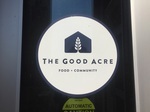
Earlier this year, HealthEast took advantage of a new contract with its food supplier Sodexo to connect the national food services corporation with The Good Acre, a local food hub adjacent to the Central Corridor.

This innovative connection is setting off a chain recreation among CCAP health care partners interested in securing regional prosperity through increasing spend with local businesses, and may promise longer term local spend opportunities for other CCAP partners. Health care partners have an opportunity to shift 5% of their spend to local vendors and producers through this model of working with large food supply companies on strategic procurement.
Partnering Around Local Food Purchasing
The Central Corridor Anchor Partnership has long identified local food as a priority focus for increasing local spend. All partners operate some level of food service for students, staff, or patients, and recognize that there is an abundance of locally produced food in our region. Increasing the amount of local food purchased takes collaboration over time, due to the structure through which our partners make food purchases. Most partner institutions utilize outside food service managers like Sodexo, Aramark and A’viands. Any increase in local purchasing must first go through these companies’ large national supply chains.

With HealthEast’s leadership, Sodexo began exploring how to purchase Minnesota-grown produce through The Good Acre, a non-profit food hub formed to reimagine how food and community is created and shared in the Twin Cities. “The value in investing in local food purchasing is that our patients, employees, and community all benefit,” noted John Swanholm, Vice President of Community Advancement at HealthEast and Executive Director of the HealthEast Foundation. “Our patients and employees want local, healthy food options, and our community benefits from our spending these dollars locally.”
The pioneering work by HealthEast and Sodexo in opening this supply chain has spurred similar investment by CCAP’s other health care partners. Regions/HealthPartners and Fairview are working to purchase more local produce through Sodexo, an opportunity enabled through Sodexo’s partnership with The Good Acre. The local food hub sub-contracts with immigrant, low-income, and independent farmers, including the Hmong American Farmers Association. There are typically 40 farmers supplying in a given season. The Good Acre, working as a broker of sorts, will supply Sodexo with two peak-season vegetables per month during the upcoming spring, summer, and fall 2017 growing seasons. Early plans call for Sodexo to buy more than 8,000 pounds of local produce through The Good Acre—a total value of approximately $20,000. The Good Acre has also begun discussions with U.S. Foods, which contracts with some health care partner institutions.
“Ideally, HealthEast’s experience with Sodexo and The Good Acre will provide a framework for other partners as they continue to expand their focus on local purchasing,” said Swanholm.
A Hub for Food Connections

The Good Acre, which opened in fall 2015, is a key partner in this work. Modeled as a central space for local food dialogue and distribution, with a mission of enhancing how food is grown and shared in the Twin Cities, the organization supports several needs in the food community while advancing education about and access to locally-grown produce in the Twin Cities. “We help farmers get to the level of wholesale production while paying them a fair price, without overwhelming buyers with the higher price of local goods,” said Rhys Williams, Executive Director of The Good Acre. “Institutions are an ideal target for our farmers’ produce.”

The facilities and warehouse infrastructure of The Good Acre include food transport options, cooler and freezer storage, and sorting, packing, and wholesale distribution resources. The organization also operates a multi-farm community supported agriculture (CSA) program with over 450 members and a hands-on teaching kitchen and classroom. “Our mission is to improve the market for small farmers,” said Williams. “That’s our goal. We do everything through that lens.”
The local food purchasing program has the potential to grow in future years as more farmers meet the stringent food safety requirements of health care, and eventually, education institutions.
A Dynamic Commercial Kitchen
The Good Acre’s commercial kitchen space was originally intended to serve as a teaching area for farmers who wanted to preserve their product. “Farmers are busy farming,” said Nick Mabe, Manager of Warehouse Logistics and Sales at The Good Acre. “Farmers don't have time to preserve product during the season when they're growing and selling it.”
The Good Acre has about ten food makers in the space right now who are looking to source more product. “We focus on local, produce-heavy food makers such as kimchi makers, salsa makers, and chutney makers,” said Mabe. Emily Paul, Program Director of The Good Acre, quickly converted the space into a teaching kitchen to the public as well as a space for food makers.
The Good Acre does not itself prepare or process food, but many institutional accounts buy a significant amount of prepared or processed food. The non-profit is working on a pilot program to determine if it can develop the capacity to begin food processing activities. “A lot of the processors in the area go fresh, but they're not using a large amount of local produce due to variability, quantity, consistency,” noted Mabe. “We're trying to bridge that gap for them.”
The commercial kitchen runs two to five cooking classes each week, partnering with chefs from around the Metro area. “We just had Chris Uhrich from Mucci’s come in and teach a class about making gnocchi, fettuccini, and other Italian signatures,” commented Mabe. In the coming weeks, The Good Acre has Sara Johannes from Top Chef, Heidi Skoog from Serious Jam, and Restaurant Alma coming in to teach cooking classes to the public.
The classes are provided at a more affordable price point and many are geared toward seasonal produce and products that The Good Acre supplies from partner farms. Classes range from basic knife skills to a three-day, adult cooking class boot camp. They also offer cooking classes for teens and children ages five to eight. For companies interested in corporate events, The Good Acre can provide meeting space and a unique team activity. “If a company wants to get off-site for a few hours, they can have a meeting in our conference space and then do a team building exercise,” said Mabe. “We can have them come in, teach a recipe, and have them work on it together.”
The Good Acre recently partnered with Lakewinds Food Co-op for a maker-to-market program. “Lakewinds had some different products they were looking to source and source locally but found some holes in the market,” explained Mabe. “There are food makers out there that need some assistance scaling up to sell to co-ops and other institutions.” Out of 25 applicants, Lakewinds selected four. Lakewinds is helping these food makers with marketing, price points, and sourcing, while The Good Acre is providing distribution and distribution advice.
By partnering around local food purchasing, providing a hub for food connections, and developing a dynamic commercial kitchen space, The Good Acre is bringing farmers, food makers, and communities together using a sustainable approach.
